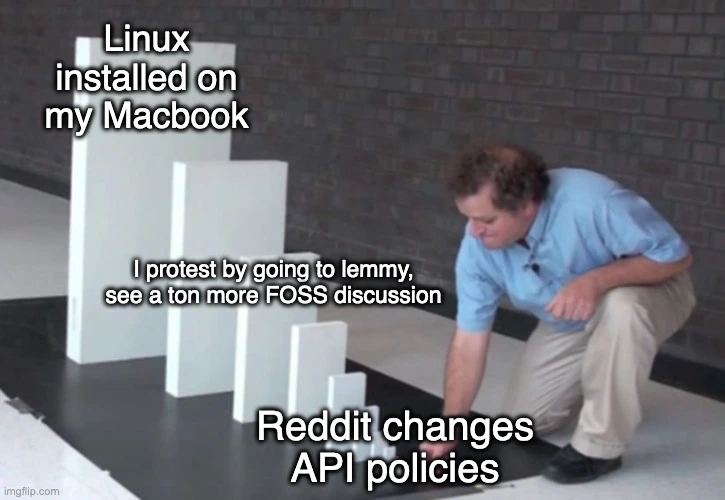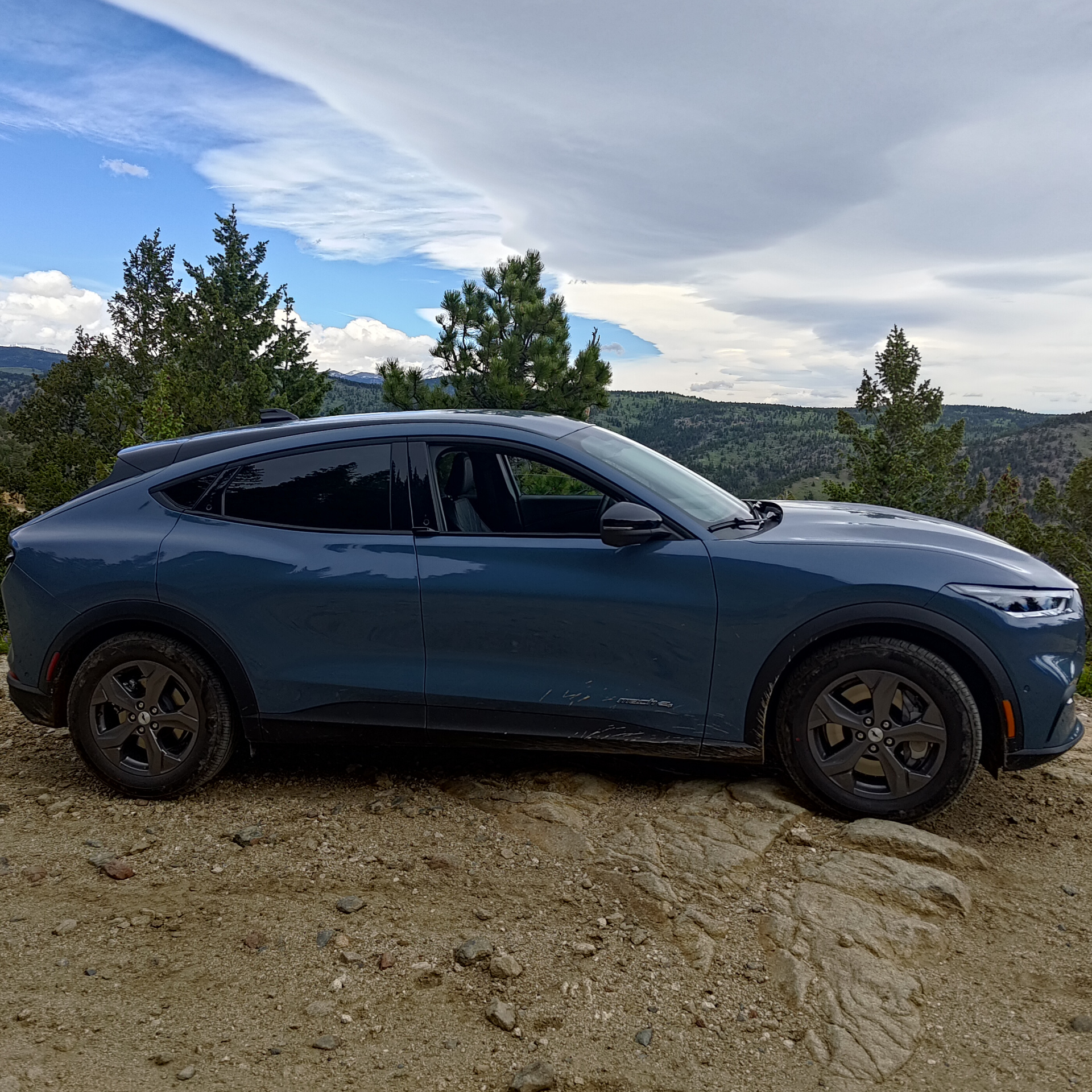I now have a working Linux installation on my laptop. Honestly, I doubted I’d ever be here again.
I quit my sysadmin job a little over 10 years ago to pursue a non-technical career (law school, now lawyer), and I just didn’t have the mental bandwidth to keep up with all the changes being made in the Linux world: systemd, wayland, the rise of docker and containerization, etc. Eventually, by 2015, I basically gave up on Linux as my daily driver. Still, when I bought a new laptop in 2019, I made sure to pick the Macbook with the best Linux hardware support at the time (the 2017 13" Macbook Pro without the touchbar or any kind of security chip, aka the 14,1). Just in case I ever wanted to give Linux a try again.
When the reddit API/mod controversy was brewing this summer, I switched over to lemmy as my primary “forum,” and subscribed to a bunch of communities. And because lemmy/kbin seemed to attract a lot of more tech-minded, and a little bit more anti-authoritarian/anti-corporate folks, the discussions in the threads started to normalize the regular use of Linux and other free/open source software as a daily driver.
So this week, I put together everything I needed to dual boot Linux and MacOS: boot/installation media for both MacOS and Linux, documentation specific to my Apple hardware, as well as the things that have changed since my last Linux laptop (EFI versus BIOS, systemd-boot versus grub2, iwd versus wpa-supplicant, Wayland versus X, etc.). I made a few mistakes along the way, but I managed to learn from them, fix a few misconfigured things, and now have a working Linux system!
I still have a bunch of things to fix on my to-do list: sound doesn’t work (but there’s a script that purports to fix that), suspend doesn’t work (well, more accurately, I can’t come back from suspend), text/icon size and scaling aren’t 100% consistent on this high DPI screen, network discovery stuff doesn’t work (I think I need to install zeroconf but I don’t know what it is and intend to understand it before I actually install and configure it), I’d like a pretty bootloader splash screen, still have to configure bash (or another shell? do people still use bash?) the way I like it.
But my system works. I have a desktop environment with a working trackpad (including haptic feedback), hardware keys for volume (never mind sound doesn’t actually work yet), screen brightness, and keyboard backlight brightness. I have networking. The battery life seems to be OK. Once I get comfortable with this as a daily driver, I might remove MacOS and dive right into a single OS on this device.
So thank you! Y’all are the best.
You were a sysadmin then became an attorney? How do you have any faith in humanity left?
It’s kinda liberating to peek under the hood and confirm that society, like the internet, is mostly held together with figurative duct tape, that someone put there as a temporary fix that became semi-permanent. The concept of technical debt for software and technology projects exists everywhere, including in the backlogs of what our government agencies, court systems, and corporate organizations are doing (and what they simply haven’t done yet).
But the whole thing is still pretty resilient. The individuals who make the decisions that feed into the unimaginably complex web of interdependent relationships and rules might not actually understand every detail, and mostly aren’t even benevolent actors who want the best for everyone, but the system as a whole still trudges along, mostly making life better than if the system didn’t exist at all. And once you learn how at least some parts of it work, you can make some changes here and there for the better, either for yourself or for the people/issues you care about or for the entirety of the system.
As someone who didn’t make it into law school, and didn’t keep trying partly because people who knew me well figured I’d likely have a stroke from rage as an attorney, I appreciate your wholesome and optimistic outlook you’ve carried into the career. Keep fighting the good fight!
Thanks! I found that this brand of optimism was a nice counterweight to my belief that people are just generally fundamentally flawed (and often irredeemably so). But the same is true of computer systems and technology, and I realized that I can love things (technology, TV shows, books, music, websites, cities, foods) while acknowledging their shortcomings, so I can do the same for people and institutions made out of people. Once I abandoned the idea that I could only like things that were perfect (or even good), and decoupled my perception of whether something was good with whether I liked it or not, it really helped me with my outlook towards people and physical things and intangible concepts.
You’re implying they have any. Faith isn’t a requirement nowadays
Congrats! I would love to go a bit geeky again one day and have a Linux OS running on my Mac. But since I have an M1 it means asahi Linux which seems to still be in its infancy (wish them all the best!)
Quite a coincidence that, Asahi just today announced Fedora Asahi Remix
They are planning an official release on end of Aug, and plans to maintain it too as an upstream-first manner
Yes I noticed this when I checked up on it after I posted. Guess I’ll have to give it a go end of august, I’m excited :D
I’m with you OP. All of this controversy the last couple of months not only sent me to decentralized social media, but finally made me pull the trigger on FOSS hosting projects. Currently working on selfhosted cloud storage for photos and documents. I already have my phone’s camera backing up to a RaspberryPi server in my living room, instead of to Google Photos.
The end goal is to decouple as completely as I can from Google - and the spider’s web of interconnected and interdependent online services - to something that I own (or at least have a measure of control over).
The downside is that it’s been a long time since I was in the server game. The learning curve is more like a vertical cliff face.
The learning curve is more like a vertical cliff face.
I had experience with headless servers before 2010, but lots of things have just changed, not least of which is the availability of good documentation. A big chunk of knowledge out there is in the form of informal blog posts or Stack Overflow/Quora/Reddit threads that don’t give version information so you don’t have a good sense of whether the information is still current. And then quite a few of the people doing things are just shoving everything into a container and blindly following commands they pasted from somewhere else, so it’s not clear which instructions are vestiges of some earlier process that is no longer necessary, which are just cargo cult steps done simply because they watched someone else do it, etc.
Photos are one of the few things I don’t entirely self-host yet. I host Immich, but I also proxy through an original Pixel, so I have unlimited Google Photos storage. It’s hard to give that up. I assume Google will make the decision for me eventually though.
I’ve been meaning to figure out the best/most affordable off-site backup, but haven’t gotten around to it yet.
I thought the hard part would be switching to another email provider, but that turned out to be easy enough. Turns out, despite having my own 100% self hosted photo storage and backup solution, I still like the ease of Google Photos for sharing, especially group-maintained albums. And I haven’t looked recently at alternatives, but the keyword search and face/pet recognition in Google Photos is something really, really useful.
Join us at !degoogle@lemmy.ml
You can ask questions or share your wisdom, and we all help each other on that journey to cutting the cord.
I’m right there with you. The reddit thing has pushed me over the tipping point. I wiped Windows from my gaming PC and installed Linux Mint. I also am testing out /e/os on my phone.
This is why companies like Adobe fight open source at every level and will never support Photoshop on Linux. Freedom is contagious.
Needs another larger domino saying “I sell my Macbook and buy a Linux-oriented laptop (System76, Framework, Star Labs, Tuxedo Computers, etc).”
I actually just canceled my preorder for the AMD Framework. I decided I didn’t need a new device if I could stretch out the life of this laptop for as long as it stays alive. My next new machine will probably be Framework, but that might not be for years.
Or a Framework.
Or a thinkpad.
Those have proprietary firmware that’s running god-knows-what.
Doesn’t interfere with Linux.
If I’m buying a product with FOSS in mind it would make a difference to me
It’s a reasonable compromise for many people, but it really depends on what you want.
Some people want to install Ubuntu and start using it instead of struggling with nvidia driver issues all day. Old ThinkPads are pretty good for most people.
Some people are willing to pay twice the price, and demand more privacy in return. There are a few companies offering laptops like that, but many of them are on the opposite side of the planet, so I hope you don’t mind paying shipping fees and bonus taxes. Also, it comes with a US layout keyboard, so let’s hope you didn’t grow up anywhere else in the world. Looking for brackets and equal signs will make you go crazy. Regardless, this category is really good for people with very strict privacy requirements.
Hats off to ya!
Welcome back! I dabbled here and there with linux, but never got fully on board until a year or two ago.
Started by dual booting Manjaro, but had some issues with it. Moved to Arch (btw), and now my kids have the dual boot system and my daily driver is a pre-owned Thinkpad with no windows partition.
Your project would be a reach for me. Linux as as daily driver is pretty easy if you don’t dial boot and don’t use Apple hardware. I have Ubuntu on an Intel NUC and everything works just fine. Sound, camera, printer, graphics. Haha. You’re going to scare the lazy.
That’s great that hardware support for Windows-oriented laptops has made the progress it has!
The reason why I basically quit Linux in 2015 was because my hardware lost support from nvidia’s proprietary driver, and I never could get nouveau or the others to play friendly. That’s on top of the fact I never got bluetooth or the webcam to work (not that I ever intended to use those), and the proprietary Broadcom wifi driver didn’t seem to work as well as Windows. And the CPU/thermal management was atrocious, with progressively worse battery life over time. So I gave it up.
So my experience with a 2017 model of Macbook, using 2023 versions of all the firmware/software, is actually better than where I was in 2015 with a Dell laptop that literally shipped with preinstalled Linux in 2010. I think all I need to do is get past the initial setup of the non-standard or quirky hardware, and I’ll be in a better place with this laptop today than I was with my laptop in 2015.
If the typical off the shelf laptop available today is a one click installation with the typical beginner-friendly liveUSB installer, that’s great. It certainly wasn’t true in 2006 when I first switched, and wasn’t true in 2015 when I gave it up.
Thanks to all alternative products based on free and open internet community contributers.
deleted by creator
Welcome!
Congrats!
Enjoy the freedom and don’t be afraid to ask for help. In time, you will see yourself helping others and contributing to the community.
I have been feeling the same! It’s so hard to justify leaving macos though when it’s Unix already, so I have another old laptop I tinker with Linux on (plus a homelab)











